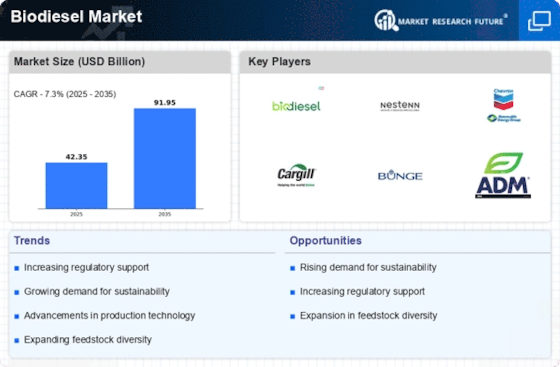Top Industry Leaders in the Biodiesel Market

*Disclaimer: List of key companies in no particular order
The biodiesel market is on a trajectory of substantial growth, fueled by increasing environmental awareness and supportive government policies. The market landscape is characterized by a diverse array of participants, ranging from established oil and gas giants to innovative start-ups, resulting in a moderately fragmented yet intensely competitive environment.
Key Players and Strategies:
A notable feature of the biodiesel market is the involvement of key players, each employing distinct strategies to secure their positions. These players include established entities such as INEOS New Planet BioEnergy, Canergy LLC, Abengoa bioenergy, Archer Daniels Midland Company, Wilmar International Limited, Bunge Limited, Neste Corporation, Emami Group, Continental Refining Company, BIOX Corporation, and others.
Major oil and gas companies like Shell, ExxonMobil, and BP have made strategic inroads into the biodiesel market through acquisitions, partnerships, and joint ventures. Leveraging their extensive infrastructure and distribution networks, these giants gain a competitive edge. Shell, for instance, has invested significantly in next-generation biodiesel production technologies and established partnerships with feedstock suppliers.
Companies like Neste, Bunge, and ADM have positioned themselves as regional powerhouses, concentrating on specific feedstocks and geographic areas. This focused approach allows them to optimize production processes and minimize costs. Neste, specializing in waste-based biodiesel production, and Bunge, capitalizing on its strong presence in South America for sourcing soybean oil, exemplify successful regional players.
Innovative start-ups are disrupting the traditional biodiesel market with a focus on advanced technologies and alternative feedstocks. Companies like Algenol are exploring novel production processes, such as microalgae cultivation and biomass gasification, to offer more sustainable and cost-effective biodiesel options.
Factors Influencing Market Share:
Several factors play a pivotal role in determining market share within the biodiesel industry:
Leading players continuously expand their production capacity to meet escalating demand, involving the construction of new facilities, optimization of existing plants, and exploring opportunities for mergers and acquisitions.
The type of feedstock significantly impacts production costs and environmental sustainability. Companies emphasize securing reliable and cost-effective feedstocks, such as used cooking oil, waste fats, and non-edible oils, to ensure long-term competitiveness.
Continuous advancements in biodiesel production technologies are imperative for cost reduction and efficiency improvement. Companies invest in research and development to enhance existing processes and explore innovative technologies for next-generation biodiesel production.
Favorable government policies, including biofuel mandates and tax incentives, are crucial for market growth. Companies closely monitor and adapt their strategies to comply with evolving regulations and leverage existing policy frameworks.
Strong marketing and distribution networks are essential for reaching a wider customer base and ensuring product availability. Companies invest in building robust distribution channels, collaborating with fuel retailers, and developing strong brand recognition to increase market share.
New and Emerging Trends:
The biodiesel industry is witnessing transformative trends that are shaping its future:
A shift towards more sustainable and readily available feedstocks, such as waste-based oils, algae, and jatropha, is underway. These alternatives offer environmental benefits while reducing dependence on traditional feedstocks like edible oils.
Companies are embracing circular economy principles by utilizing waste materials as feedstocks, minimizing waste generation, and enhancing resource utilization.
The industry explores innovative technologies like carbon capture and storage to further reduce the carbon footprint of biodiesel production, potentially making biodiesel a carbon-neutral fuel option.
Companies are integrating digital solutions like artificial intelligence, big data analytics, and automation to improve production efficiency, optimize logistics, and enhance decision-making.
Strategic partnerships and collaborations are increasingly common, allowing companies to share expertise, resources, and accelerate innovation in the biodiesel market.
Overall Competitive Scenario:
The biodiesel market is poised to remain fiercely competitive in the coming years, driven by growing demand and favorable industry trends. Established players will focus on expanding production capacity, securing feedstock sources, and investing in technological innovation to maintain market share. Meanwhile, new entrants, with disruptive technologies and alternative feedstocks, will intensify competition and contribute to overall market growth. Collaborations and partnerships will play a vital role in navigating the evolving market landscape and accelerating the development of next-generation biodiesel solutions.










